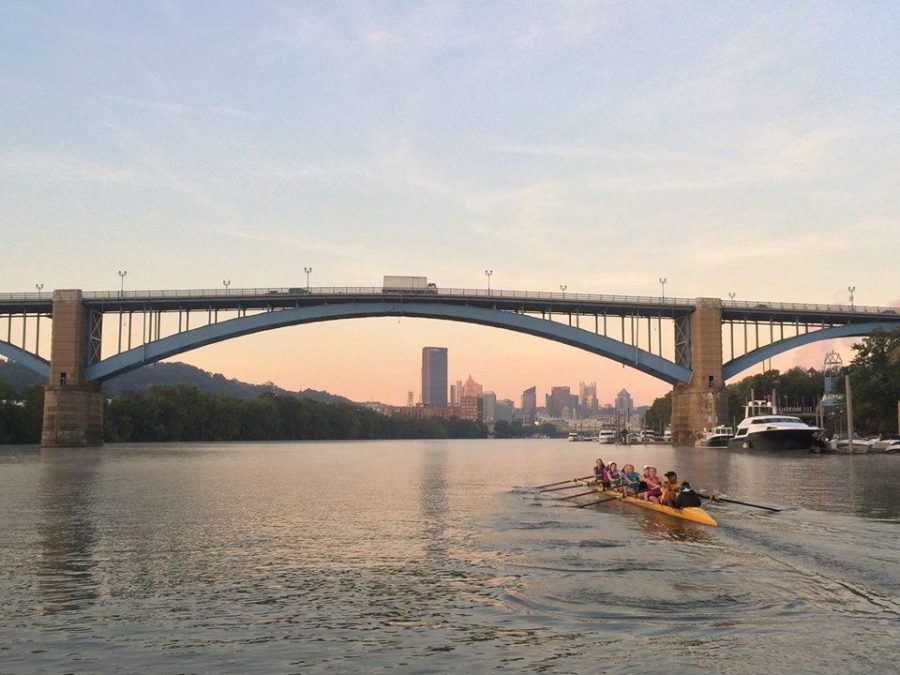At a meeting of Pittsburgh minds on Monday, Mayor Bill Peduto lamented the city’s aging transportation system.
“We have an infrastructure that is still based in the 1950s,” Peduto said. “We have to be able to change that to be able to reconnect.”
According to Peduto, Pittsburgh has a shot at becoming “smarter” through technological innovation like self-driving cars and an app that can communicate with traffic signals — he just wants $40 million to do it.
The Steel City is up against six other finalists in the U.S. Department of Transportation Smart City Challenge — a national program that offers up to $40 million to the city with the best plan to fully integrate innovative technologies into transportation.
Pittsburgh was among 78 applicants when the competition launched last December. USDOT has since narrowed that list down to just six others, including Columbus, Ohio; Kansas City, Missouri; Austin, Texas; Denver, Colorado; San Francisco, California and Portland, Oregon. USDOT will select the winner in June.
At a roundtable discussion at the Phipps Conservatory and Botanical Garden Monday morning, Peduto, along with Allegheny County Executive Rich Fitzgerald and U.S. Secretary of Transportation Anthony Foxx, discussed Pittsburgh’s fast-moving future.
Fueled by companies like Uber — the ride-booking start-up that moved into Pittsburgh last year and plans to start test-driving autonomous vehicles in the area — the city has made national headlines for its turnaround from steel to smart.
“Our job is now to think about transportation in a much different way,” Peduto said.
“It’s not about getting in a car and going somewhere, that is a part of the past. It is about how we look at all modes of mobility … and how [people] are able to get to where they need to go.”
Pittsburgh’s plan is heavily focused on creating ways to better connect people with their jobs.
As the economy develops along the Monongahela River, Peduto said reconnecting the Hill District and Oakland to Downtown, for example, would help communities that have been cut off from vital parts of the city for decades.
In places like Penn Hills, people without cars who need access to transportation more often than during weekly business hours can’t always rely on the infrequent bus service.
A dearth of public transportation in the city’s low-income neighborhoods adds to what some people, including Peduto, are dubbing “a tale of two cities.” On one hand, new technology is boosting the economy, but only for those who are able to take part in the boom.
Fitzgerald said Pittsburgh needs to harness its tech-savvy resources to fix transportation systems and address neighborhood inequalities that have been present for nearly 70 years.
“As we grow again, we need to make sure we’re growing in a smart way,” Fitzgerald said.
Pittsburgh’s application also links transportation to less recognizable issues such as air pollution and combined sewage overflow. The application plans to put devices that measure air pollution at streetlights while a second application being finalized this week will include more details on addressing combined sewage overflow.
“By combining transportation, energy and stormwater reduction, we can rebuild these neighborhoods in green ways and create things they haven’t had,” Peduto said.
Foxx said the challenge is a way of throwing down the gauntlet and urging major metropolitan areas to think differently.
“Around the world, there is a lot of conversation about what a smart city is,” Foxx said.
“This [challenge] is an opportunity to begin defining it in real terms.”
Though there can only be one winner for the competition, Foxx said USDOT will support all applicants by offering guidance on implementing their plans without the winning funds.
“We want all these cities to complete the vision work they’ve started,” Foxx said. “I’ve got my team working to deliver for all the cities, all 78 of them.”
Peduto said he plans to follow through on the plans even if Pittsburgh is not the winning city, though it would take time to raise the necessary money.
On Friday, Pennsylvania’s Department of Transportation added $11 million to Pittsburgh’s plans for the Smart City Challenge, though Peduto said PennDOT hasn’t yet specified whether that was contingent on the competition’s results.
Currently, Paul G. Allen’s Vulcan Inc., a company based out of Seattle, Washington, that supports data-driven initiatives globally, is contributing an additional $10 million to the challenge, as well as providing technological assistance and guidance to finalist cities.
Other partners for the challenge that will contribute assistance, support and funds to the winning city include Mobileye, Autodesk, Alphabet’s Sidewalk Labs and Amazon Web Services. The winner has three years to use the funds from the challenge.
Pittsburgh’s 32-page application includes using technology from Carnegie Mellon University that measures air pollutants from streetlights and a multi-modal app for travel and accident


